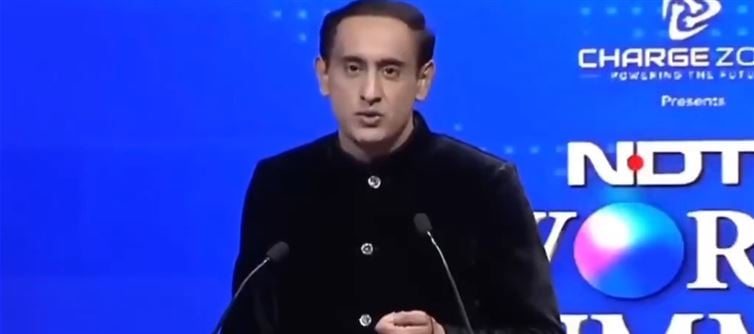
What happens when a journalist known for credibility steps on stage and flattens himself before power? At the NDTV World Summit, rahul Kanwal, the CEO and Editor-in-Chief of one of India’s leading news networks, delivered a speech that left netizens aghast. In a glittering display of praise for prime minister Narendra Modi, Kanwal lauded the PM’s handling of trade disputes with the United States, calling his leadership “decisive” and India’s stance “non-negotiable.” Yet the internet wasn’t buying it. Critics slammed the speech as bootlicking, accusing a top journalist of trading integrity for flattery on a global platform.
1. The Summit, the Stage, and the Speech
The NDTV World Summit is billed as a forum for global discussion, bringing together leaders, policymakers, and thinkers. On this stage, rahul Kanwal stood at the podium, microphones poised, delivering what many saw as more homage than journalism. He emphasized Modi’s handling of international trade tensions, saying that while “many leaders globally yielded under pressure,” Modi “stood firm and pushed back.” The audience heard phrases like “this Naya Bharat will not bend” and “the interests of 1.4 billion people remain non-negotiable.” The tone was unmistakably reverential—bordering on theatrical worship.
2. Praise or Sycophancy? netizens Speak
Once the clip hit social media, X (formerly Twitter) exploded. Many users didn’t see Kanwal’s words as legitimate analysis—they saw bootlicking. Comments ranged from sarcastic jabs to outright outrage, with one user writing, “Is this a news network or Modi fan club?” Others accused NDTV of compromising journalistic independence. Yet a smaller contingent defended Kanwal, arguing that acknowledging strong leadership is legitimate commentary. The backlash highlights a larger tension in indian media: where does reporting end and reverence begin?
3. The Trade Narrative: Leadership or Stagecraft?
Kanwal’s speech centered on trade disputes, particularly India’s dealings with the United States. He described Modi’s actions as “decisive” and courageous, implying that the PM’s leadership was above reproach. But critics argued that such language belonged in a campaign rally, not a summit discussion. Terms like “no matter what the risk – scaring Modi isn’t difficult nor impossible” drew particular ire, seen as over-the-top dramatization rather than analytical insight. For many, the speech read less like reporting and more like a performance piece designed to curry favor.
4. Journalism Under Fire: NDTV’s Reputation at Stake
rahul Kanwal is a respected name in indian journalism, and NDTV has long positioned itself as a credible news outlet. This speech, however, has fueled concerns about the media’s independence. When journalists openly lavish praise on political leaders, credibility erodes. The incident reignites the debate over whether media houses are willing to blur the lines between reporting and political flattery, especially on issues of global significance.
5. Polarization, Perception, and the Power of Words
The controversy underscores a deep polarization in India’s media and public discourse. While some see Kanwal’s words as an acknowledgment of leadership in challenging times, others see them as a sycophantic spectacle. It raises pressing questions: should journalists offer unfiltered commentary on leadership, or maintain a critical distance? And when the applause overshadows the analysis, who suffers—the audience, the news outlet, or democracy itself?
Conclusion: When Praise Becomes Political Theater
rahul Kanwal’s NDTV World Summit speech has become a cautionary tale. On the surface, it was a tribute to India’s handling of global trade tensions; beneath, critics see an unsettling surrender of journalistic integrity. In an era where media credibility is under constant scrutiny, the spectacle of a journalist publicly flatterying a sitting prime minister on a global stage is bound to provoke debate, controversy, and social media firestorms. It’s a reminder that in indian journalism, the line between reporting and reverence is thinner than ever—and crossing it can be both brutal and unavoidable.




 click and follow Indiaherald WhatsApp channel
click and follow Indiaherald WhatsApp channel